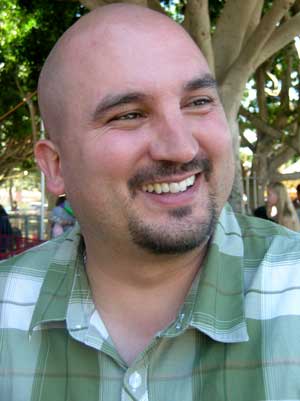|
Three Poems from My Earthbound Eye:
The Country of Poetry
There’s a letting go that happens if one is old enough.
Then one walks the garden, hands clasped behind like Plato
In the nothing hours, reciting a verse from Kings:
Concerning this house which thou art building, if thou
Execute my judgments, and keep all my commandments
To walk in them; then will I perform my word with thee,…
I climbed over branches above dirty, broken toys
With the boys with whom I played soccer in the rainy street
After summer storms in a barrio of Buenos Aires.
Now I stand on a sacred bluff in Malibu by Father Serra.
Below, a chateau, empty white stables, where crows disperse.
A man strolls with two giant dogs beside a cold pool. p>
Free
I wandered ticketless into the modern art museum;
the entrance guard did not stop me,
half hour before it opened— and only after two rooms
of Abstract Expressionists, moments after Tanguy
before Frank Stella and Motherwell’s monumental
Elegy to the Spanish Republic,
black alien splotches shaped like the helmets
of Lorca’s killers, did I realized I was alone
and shouldn’t be. No guards, not even one other person
ruminating over Hoffman, staring up
at Calder’s mobile. Then breaking from the dream
in silence, privileged to mastery under dim lights,
I decided to steal one more high-ceilinged room,
imagining myself an experienced art thief,
the torso-sized Pollock under my raincoat,
an out-of-character stasis allowing me to linger,
the threats of the partitioned planet kept at bay
by the white omnipresence of the walls
and the god of the air-conditioned halls.
I pocketed Picasso’s head of a woman,
the horrific bronze ridges, her downcast droop.
Then I took one other of a blue man sundered
by a red demon man on a dark-stained background,
growing bolder by the minute until
I nearly felt afraid and walked back toward the entrance
where a group of name-tagged specialists
rushed in, covered me as the sliding doors
slid closed. Like an agent of the Cold War
I stole ten minutes alone in that cathedral
or home, as when I wandered
into the rift between spaces; me, the only child,
under the kitchen table looking up
my mother’s skirt, the board that spelled messages
from the dead, watching the beautiful one
at the party, her parted lips, spin the twinkling bottle.
I sat pleased at one of the café tables
and watched the multitudes cue, my stolen works
under my coat, my big white rooms.
The Poetry of the Moment
Two of my students raise their hands
To ask the same question: “What is solitude?”
The assignment on the board: to write a poem
About the dichotomy of solitude and love.
And they, weary, their eyes glued over with
The scum of their age, emitting still the lore
Of teenager—the rebel without, and the chaos
That is sixteen, their mind-bending obviousness
Smacking them on the soul…daily, daily.
And we now, surrounded by the circumstances
Of what if, spring surrounding us all,
Equivalencies beyond, each of us enamored
With the next enticement, the next life.
I answer them as best I can, the rudimentary
Is usually best, though sometimes I answer
Them too coyly, unable to refer to anything
Better than history can, the hopes of the race.
Whatever the case, they will hurry past
The poetry of the moment, tripping over
Themselves to turn the assignment in,
And you may make the mistake, smirk,
And chalk it up to youth, you might make
That mistake, but I’m the one, I’m the one
They raise their hand for. I’m the only
Teacher in the room, the only one who must
Answer that question: “What is solitude?”
|

|